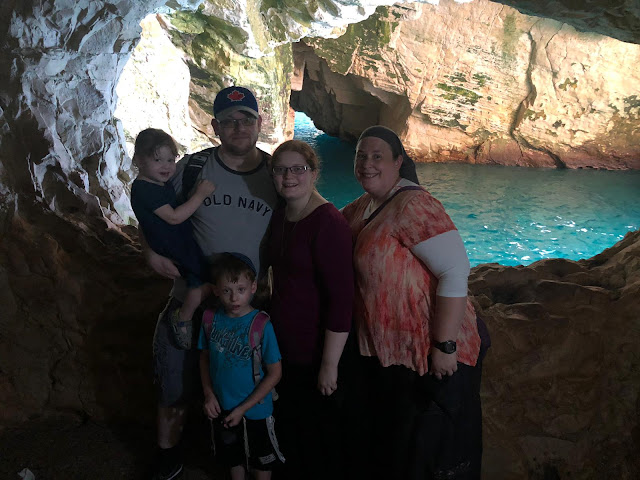It was my birthday, earlier in the week. I just wanted to get out of the apartment and do something that didn't involve walking around a shopping mall. We decided that it was a perfect day to take the 40 minute drive to the Lebanese border to witness 'a love story between the rock and the sea.' At least that is what the signs said. After years of keeping it on our family to do list, we visited Rosh HaNikra.
We called ahead to make sure it would be family friendly and Corona safe. Although they said it was best to wait until the end of the day, we decided that we would go with enough time to enjoy our day and still be home at a reasonable hour.
We arrived to find the parking lot closed. Cars were scattered up and down the roads. We took a short drive up the road, just past the sign warning that the border was up ahead. We were able to find parking that wasn't to far away from the entrance to the parking lot.
 |
| View of parking lot from our car |
We knew which direction to walk. We eventually found our way to the area for purchasing tickets for the cable car. We also decided to upgrade our tickets for an extra activity quasi off the beaten path. We were told that the cable car would be limited to 7 passengers and that it would be an hour wait to get to the bottom. So we headed over to the line, which was staggered into 3 sections. Staff walked through the line at regular intervals to make sure that everyone was still wearing their masks. We also saw some police officers who would have had the authority to issue the 500 NIS fine for not wearing them correctly.
 |
| The view while waiting in line |
They were not joking about the wait times. We eventually made it onto the cable car, down to our destination. By that point it was lunch time and we were all really hot. We bought a few cold drinks and found a nice quiet spot, on astroturf with umbrellas to offer us shade.
After lunch it was time to go into the grottoes. They were absolutely breathtaking. The only issue I had was that there were way too many people who thought they were super models. Their efforts to take the perfect picture, inconvenienced everyone else. It was well worth it.
After we finished in the grottoes, we walked through a tunnel. The tunnel was built by the British in 1942 to connect Beirut and Haifa, to allow the transfer of military supplies. It was blown up in 1947 to prevent Arab fighters from being able to reach Haifa.
Shlomo spent the walk telling Hoodie and anyone who would listen that trains used to be here and then they turned it into a museum.
At the other end of the tunnel, our chariot was waiting for us. OK, it wasn't a chariot, it was a golf cart. We had rented it for 45 minutes as something fun and different to do. We were allowed to drive it as far as the nearby beach. Peri and I took turns driving around and the kids also had fun checking out the area in our slow moving vehicle. Did you know that Israel has trailer parks? We also saw a tent, set up in the kids park, near the beach. I wonder what the story was there.
From there it was back into the much shorter line up the cable car. We stopped for ice cream at the top. We then headed back to the car to pack it in for the day. We made it home in time for dinner.
I had a really great birthday. It was a really fun family tiyul.

















